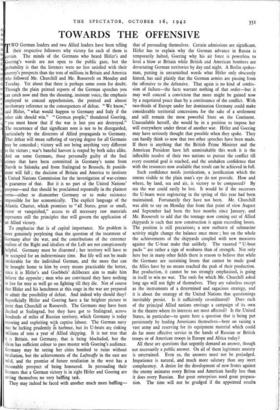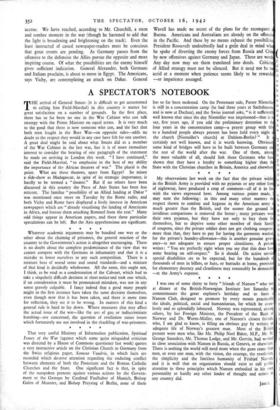TOWARDS THE OFFENSIVE
WO German leaders and two Allied leaders have been telling ring's words are not open to the public gaze, but the obability is that the listeners were no less satisfied with their ountry's prospects than the tens of millions in Britain and America ill ho followed Mr. Churchill and Mr. Roosevelt on Monday and sci Tuesday. Yet about that there is perhaps some room for doubt. Through ,the plain printed reports of the German speeches you can catch now and then the shouting, insistent voice, the emphasis employed to conceal apprehension, the pointed and almost involuntary reference to the consequences of defeat. "We know," said Hitler, "what would happen to Germany and Italy if the other side should win." "German people," thundered Goering, "you must know that if the war is lost you are destroyed." he recurrence of that significant note is not to be disregarded, rticularly by the directors of Allied propaganda to Germany. hat defeat will mean suffering of varying degree for all Germans ay be conceded ; victory will not bring anything very different o the victors ; war's baneful harvest is reaped by both sides alike.
d on some Germans, those personally guilty of the foul rimes that have been committed, in Germany's name from arvik to Salonika and from Stalingrad to Brussels, fit punish- ment will fall ; the decision of Britain and America to institute a United Nations Commission for the investigation of war-crimes is guarantee of that. But it is no part of the United Nations' , purpose—and that should be proclaimed repeatedly in the plainest emis—either to dismember Germany or to make existence Impossible for her economically. The explicit language of the a Atlantic Charter, which promises to "all States, great or small, victor or vanquished," access to all necessary raw materials represents still the principles that will govern the application of an Allied victory.
To emphasise that is of capital importance. No problem is more genuinely perplexing than the question of the treatment of Germany after the war, and the contributions of the extremer realists of the Right and idealists of the Left are not conspicuously helpful. Germany must be disarmed ; her territory will have to be occupied for an indeterminate time. But life will not be made intolerable for the individual German, and the more that can be brought home to him by every means practicable the better, since it is Hitler's and Goebbels' deliberate aim to make him believe the opposite ; men who are convinced they have nothing to live for may as well go on fighting till they die. Not of course that Hitler and his henchmen at this stage in the war are prepared to admit the possibility of defeat. And indeed why should they? Superficially Hitler and Goering have a far brighter picture to paint than Churchill or Roosevelt. The Germans may have been checked at Stalingrad, but they have got to Stalingrad, across hundreds of miles of Russian territory, which Germany is today restoring and exploiting with captive labour. The German navy may be lurking prudently in harbour, but its U-boats are sinking millions of tons a year of Allied shipping. It is not true that it is Britain, not Germany, that is being blockaded, but the Claim has sufficient colour to pass muster with Goering's audience. Germany may be seeing her cities bombed to ruins without retaliation, but the achievements of the Luftwaffe in the east are solid, and the promise of future retaliation in the west has a reasonable prospect of being honoured. In persuading their listeners that a German victory is in sight Hitler and Goering are setting themselves no very baffling task.
They may indeed be faced with another much more baffling— that of persuading themselves. Certain admissions are significant. Hitler has to explain why the German advance in Russia is temporarily halted, Goering why his air force is powerless to level a blow at Britain while British and American bombers are devastating German territories by day and night. A Berlin spokes- man, putting in unvarnished words what Hitler only obscurely hinted, has said plainly that the German armies are passing from the offensive to the defensive. That again is no kind of confes- sion of failure—the facts warrant nothing of that order—but it may well conceal a conviction that more might be gained now by a negotiated peace than by a continuance of the conflict. With two-thirds of Europe under her domination Germany could make considerable territorial concessions for the sake of a settlement and still remain the most powerful State on the Continent.. Unassailable herself, she would be in a position to impose her will everywhere under threat of another war. Hitler and Goering may have seriously thought that possible when they spoke. They can hardly think so now that two other speeches have been made If there is anything that the British Prime Minister and the American President have left unmistakable this week it is the inflexible resolve of their two nations to pursue the conflict till every essential goal is reached, and the unshaken confidence that with the resources now available that result can be achieved in full.
Such confidence needs justification, a justification which the omens visible to the plain man's eye do not provide. How and where, by land, sea and air, is victory to be compassed? By sea the war could easily be lost. It would be if the successes the U-boats were registering in the spring of this year had been maintained. Fortunately they have not been. Mr. Churchill was able to say on Monday that from that point of view August and September had been the best months since January, and Mr. Roosevelt to add that the tonnage now coming out of Allied shipyards is such that new construction is again exceeding losses. The position is still precarious; a new outburst of submarine activity might change the balance once more ; but on the whole the achievements of the shipyards coupled with new measures against the U-boat make that unlikely. The vaunted "U-boat packs" are rather a sign of weakness than of strength. Not only here but in many other fields there is reason to believe that while the Germans are sustaining losses that cannot be made good the Allies have by no means reached the peak of their production. But production, it cannot be too strongly emphasised, is going in itself to win no war. The tools for which Mr. Churchill asked long ago will not fight of themselves. They are valueless except as the instruments of a determined and sagacious strategy, and it is about the strategy of the United Nations that questionings inevitably persist. Is it sufficiently co-ordinated? Does each of the principal Allied nations envisage a campaign of its own in the theatre where its interests are most affected? Is the United States, in particular—to quote here a question that is being put persistently by leading Americans themselves—bent on raising a vast army and reserving for its equipment material which could do far more effective service in the hands of Russian or British troops or of American troops in Europe and Africa today?
All these are questions that urgently demand an answer, though not necessarily a public answer. On all of them legitimate anxiety is entertained. Even so, the answers must not be prejudged. Impatience is natural, and much more salutary than any inert complacency. A desire for the development of new fronts against the enemy animates every Briton and American hardly less than it does every Russian. But great enterprises need great prepara- tion. The time will not be grudged if the appointed results accrue. We have reached, according to Mr. Churchill, a stern and sombre moment in the War (though he hastened to add that the light is broadening and brightening on the track). Even the least instructed of casual newspaper-readers must be conscious that great events are pending. As Germany passes from the offensive to the defensive the Allies pursue the opposite and more inspiring course. Of what the possibilities are the enemy himself gives sufficient indication. General Alexander, both Germans and Italians proclaim, is about to move in Egypt. The Americans, says Vichy, are contemplating an attack on Dakar. General Wave11 has made no secret of the plans for the reconquest Burma. Americans and Australians are already on the offensiv in the Pacific. And these by no means exhaust the possibiliti President Roosevelt undoubtedly had a great deal in mind wh he spoke of diverting the enemy forces from Russia and by new offensives against Germany and Japan. These are wor Any day now may see them translated inter deeds. Critici of Allied strategy must not be silenced. But it need not be t acrid at a moment when patience seems likely to be reward —or impatience assuaged.



























 Previous page
Previous page